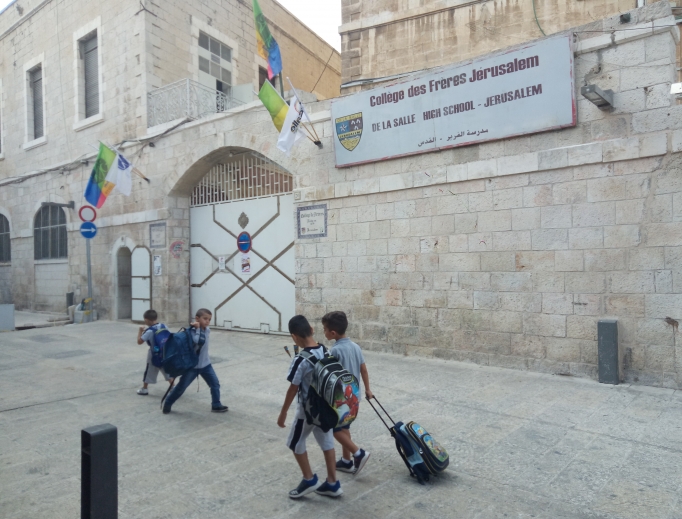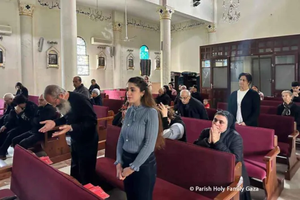Israel’s Christians Reflect Gloom as Jerusalem Elections Loom
The city’s small Christian community doubts its concerns will be addressed, whoever wins in the Oct. 30 municipal vote.

JERUSALEM — Catholic shopkeeper Alfred Ra’ad plans to vote in Jerusalem’s upcoming municipal elections but has little faith that his vote will help him or other Christians in their fight for equal services.
“I have Israeli citizenship, and I take my right to vote seriously,” said Ra’ad, seated on a chair in front of his empty store in the Christian Quarter of the Old City. “But whoever wins the election won’t work on our behalf. Our numbers are too small to make a difference.”
Ra’ad said the municipality favors Jewish neighborhoods over Arab neighborhoods and that the city didn’t consult the Christian Quarter’s shopkeepers when it built a light rail line right outside the entrance to the quarter.
“It has ruined the area. Before the trolley, 100 tour buses used to park outside. Since the trolley, business has plummeted 85%. I used to earn $300 to $400 a day, and now it’s more like $10. We’re nearing collapse,” Ra’ad said solemnly.
“The municipality has been unresponsive because we’re the Arab sector.”
Roughly 9,000 Arabic-speaking Christians and 2,000 non-Arabic-speaking Christians live in Jerusalem on a permanent basis, the majority of them on the eastern, predominantly Arab side of the city. Some have Israeli citizenship, some don’t, but permanent-resident status allows all of them to vote in local elections.
For decades, Palestinian officials have urged Christians and Muslims living in Jerusalem to boycott Israeli elections, especially in Jerusalem, half of which the Palestinians claim as the capital of their state. Voting in Israeli elections, the officials say, is tantamount to recognizing Israeli sovereignty.
According to the United Nations, Jerusalem was to be an international city under the sovereignty of no nation — a status warmly embraced by the Vatican. But in 1948, when Arab armies attacked the new state of Israel, Jordan seized East Jerusalem and Israel seized West Jerusalem. Israel captured East Jerusalem from the Jordanians during the 1967 Middle East War and annexed it soon afterward.
The Catholic Church in Jerusalem, which has diplomatic relations with both Israel and the Palestinian Authority, neither encourages nor discourages Christians to vote.
“In principal, we as a Church don’t say who to vote for or what to vote for. We trust the faithful to do whatever they think appropriate,” said Wadie Abunassar, chairman of the media committee of the Assembly of Catholic Ordinaries in the Holy Land.
What’s at Stake
Jerusalem’s Christians have a great deal at stake in the Oct. 30 election, from the shortage of housing and building permits in the Arab side of the city to property taxes on Church-owned property. Jerusalem’s outgoing mayor has demanded that the local Christian Churches, long exempt from property tax, pay millions of dollars in back taxes.
Some of the Churches own vast tracts of land in Jerusalem, which is a poor city with a very low tax base. Many city residents believe that religious institutions should pay taxes on any property that is not being used exclusively as a place of worship.
Even more worrying: An Israeli lawmaker wants to pass a law that would nationalize Church property, after the cash-strapped Greek Orthodox Church sold the land on which thousands of Israeli homes stand to private real estate developers without the knowledge or permission of the homeowners or government. These developers are demanding that homeowners pay hundreds of thousands of dollars per home to continue to lease the land.
Abunassar said the Catholic Church has a “stake” in Jerusalem and the Holy Land as a whole, but befitting the Holy See’s status, takes its grievances not to the municipalities but to the Israeli and Palestinian governments.
“The Church deals with the national authorities, where the main decisions are taken. We don’t want to meddle in Israeli politics, so publicly we often remain silent. But we deal with various official channels,” Abunassar said.
Local Christians, who comprise around 1% of Jerusalem’s population, say they have no such clout.

Housing Issues
There is a severe shortage of housing in East Jerusalem, and although the candidates (all Jewish) who are running for mayor have vowed to greatly increase the number of housing units, it appears that few to none of these homes are intended for the Arab population.
In an interview with the Times of Israel, candidate Ze’ev Elkin vowed to build an additional 100,000 homes by 2040 and implied that doing so is necessary to maintain a Jewish majority in Jerusalem. Approximately 40% of the residents of Jerusalem are Arab.
“The number of Jews in the city is falling compared to other population groups,” Elkin said. “Negative migration of the Jews from the city means we are now at 60%-40% Jews to Arabs.”
Asked whether the city will also be building homes in the Arab sector in East Jerusalem, Elkin replied, “There are lots of issues with the way they build and use the space. That is something we will get to when in office, but I’m focusing on different issues at the moment.”
A Christian from the United States who spoke on the condition of anonymity said the housing shortage in the Old City’s Armenian Quarter has forced his children to move to neighborhoods outside the Old City.
“They rent because they can’t afford to buy because housing is so expensive,” the man, also a store owner, said. While the municipality is partly at fault, he said, “I blame the [Armenian] community for most of the problem.”
“The Armenian Church owns enough property to house everyone in the community, but that property isn’t evenly distributed. Some people are given nine rooms and others just one.”
Ra’ad said the Christian community in Jerusalem is holding with a fraying thread.
“In the entire Old City there are only 10 Catholic-owned shops and 30 Orthodox-owned shops among 1,500 Muslim-owned shops,” he said. “I no longer call myself a merchant. I call myself a beggar.”
Michele Chabin is the Register’s Middle East correspondent.
- Keywords:
- christians in jerusalem
- christians in the holy land
- holy land
- israeli christians
- jerusalem
- michele chabin
















